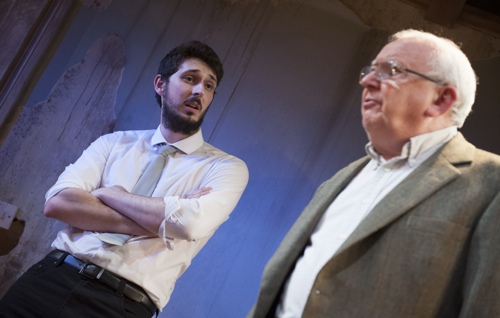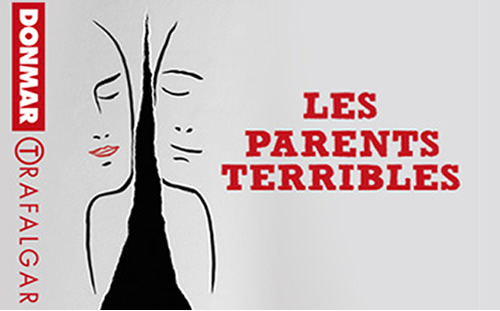
Rob Hayes’ Step 9 (Of 12), directed by Tom Attenborough, is a tremendous play of great importance. It opens with recovering alcoholic Keith, portrayed with strength by Blake Harrison, sitting in a dishevelled armchair in his bedsit with a Virginia Woolf novel in one hand and a pipe in the other. This contrived façade of debonair decadence quickly crumbles in the wake of the arrival of his former foster carers, Alan and Judith. Keith, once careering from crime to crime, has many reasons to seek forgiveness. Gradually, the cracks in the family unit become chasms; Keith is not the only one with things to be sorry for.
Blake Harrison, star of teen comedy The Inbetweeners, proves his maturity and sensitivity as the potty-mouthed yet sympathetic Keith. He is a strong central presence, at times seeming to regurgitate the psychobabble he has been fed by countless pamphlets and therapists. Harrison gives a skilfully nuanced and humorous performance, capturing well a tangible sense of pain in Keith.
Barry McCarthy’s performance as Alan encapsulates the good-hearted nature of a respectable middle-aged English teacher, simply trying to do well by his fostered son. He even does his best to drink the cup of gravy mistakenly served in place of coffee. McCarthy portrays the troubled man with tenderness. Wendy Nottingham contrasts well as the cold, unbending force of nature, Judith. Nottingham portrays Judith’s muddled feelings for Keith with precision and is an entirely compelling foil for husband and fellow English teacher Alan.
When the vengeful son of one of Keith’s victims, Mark, arrives at Keith’s flat, forgiveness is not quite as easy as Keith supposes. Ben Dilloway’s performance as Mark is touching at times. There is a pivotal volte-face when he accuses Alan and Judith of bearing some of the responsibility for Keith’s violent attack on his father. Keith arguably had an excuse; he was an addict. Alan and Judith, however, had no excuse for inciting the violence Keith committed. This is the play’s critical moment.
With razor-sharp wit and an unsettling sense of darkness, the bedsit becomes a microcosmic interrogation of the traditional family values
In a naturalistic production, director Tom Attenborough shows finesse in developing intense atmosphere and uses the space shrewdly. The disintegrating surroundings, designed by Francesca Reidy, echo suggestions of a decaying society. Neill Brinkworth’s lighting and Victoria Wilkinson’s sound complement the set well, completing the creation of a cold, fractured ambiance.
Through an incredibly well crafted script writer Rob Hayes convincingly argues that Keith’s carers, in every way embodiments of the established order, are also to blame for his violence. This is an argument that is rather timely following the mass violence of last summer. Hayes’ play resonates far beyond the confines of the intimate setting. With razor-sharp wit and an unsettling sense of darkness, the bedsit becomes a microcosmic interrogation of the traditional family values that are so commonly championed by politicians of every ilk. It is not only a commentary on the lives of these characters; it is a commentary on societal responses to violence. Hayes haunting indictment suggests that absolving parents, carers and the establishment of guilt is a grave mistake. This is a play that everyone needs to see, before it is too late.



We must have watched a different play. I can honestly say it was one of the worst pieces of theatre I have seen in the last few years. How the Trafalgar Studios could let such a badly written piece of work grace their stage is beyond me, it truly is awful. And the main guy from the Inbetweeners acts in one note through the whole play, there was no emotional depth to his performance and it came out as just a load of memorized text, never once did it feel spontaneous. I really think he should stick to kids television. I can not stress enough how terrible this is, avoid like the plaque!